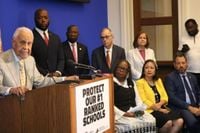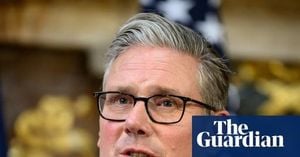On Thursday, July 24, 2025, a powerful coalition of Virginia Democrats, led by former Governor L. Douglas Wilder, gathered in Richmond to push back against what they describe as politically motivated attacks on the state’s higher education system. The event spotlighted growing tensions over university governance, federal investigations, and the role of diversity, equity, and inclusion (DEI) initiatives within Virginia’s public universities.
Wilder, who made history as the first African American elected governor in the United States, did not mince words. “What we’re seeing today is not about policy differences. It’s about a pattern, a coordinated effort to silence, punish and erase,” he said, framing the controversy as a deliberate campaign to undermine progress in education and civil rights.
The backdrop to this showdown includes a series of federal investigations launched by the Trump administration into Virginia’s flagship institutions, particularly the University of Virginia (UVA) and George Mason University (GMU). These probes have scrutinized DEI programs, employment practices, and allegations of antisemitism on campus, stirring fears among Democrats that the investigations are less about legal compliance and more about political interference.
Just weeks before the rally, UVA’s president, Jim Ryan, resigned amid pressure from the U.S. Department of Justice and political scrutiny over the university’s DEI efforts. The DOJ claimed UVA had failed to fully dismantle these initiatives, accusing the university of merely rebranding them. Meanwhile, GMU has faced four separate federal investigations in the past month alone, including one focused on discrimination in admissions and another on antisemitism complaints. GMU officials have stated they are cooperating but deny any wrongdoing.
House Democratic Leader Charniele Herring, a GMU alumna, defended her alma mater and other Virginia institutions, emphasizing the importance of facts and fairness. “This generation of students deserves better than to be caught in the crosshairs of a partisan law affair. They deserve investment, not interference. They deserve opportunity, not obstruction, and they deserve degrees, not delusions,” she declared.
The debate over DEI initiatives lies at the heart of the conflict. These programs, rooted in the post-Civil War Reconstruction era through efforts like the Freedmen’s Bureau, aim to promote fairness and inclusion for historically marginalized groups. Wilder described DEI as “tools of fairness” grounded in constitutional values. However, Republicans argue that such initiatives risk prioritizing identity over merit, raising concerns about “reverse discrimination” and ideological bias.
Governor Glenn Youngkin’s administration has taken concrete steps to roll back DEI programs, including renaming the state Office of Diversity, Equity and Inclusion—replacing “equity” with “opportunity”—and eliminating DEI-driven education programs in public schools. UVA’s governing board was the first in Virginia to dissolve its DEI initiatives, but this did not halt federal investigations or political pressure.
Another flashpoint has been the appointment process for university governing boards, which wield significant power over institutional policies, budgets, and leadership. Traditionally, the governor appoints members to these 16-person boards, who serve staggered terms. However, tensions escalated after Senate Democrats rejected eight of Youngkin’s appointees, including prominent conservatives like former Virginia Attorney General Ken Cuccinelli and former commerce secretary Caren Merrick. The rejections sparked a lawsuit, with Youngkin’s administration arguing the appointees can remain until the General Assembly reconvenes.
Democratic lawmakers are now pushing for legislative reforms to depoliticize the appointment process and reinforce the General Assembly’s oversight role, as stipulated in Virginia code. Senate Majority Leader Scott Surovell proposed requiring appointees to be confirmed by the legislature before serving and extending terms from four to six years to prevent any single governor from dominating the boards. He also advocated for universities to have the authority to hire their own legal counsel rather than relying on attorneys assigned by the state’s Office of the Attorney General, a move seen as necessary to defend against politically charged investigations.
Shaun Kenney, spokesperson for Attorney General Jason Miyares, disputed claims that the office is failing to represent universities effectively. “Any assertion that our colleges and universities are not being vigorously represented is categorically false,” he said, affirming the administration’s commitment to enforcing federal civil rights and anti-discrimination laws.
Republican leaders have accused Democrats of ignoring the “real issue” — the federal investigation into antisemitism complaints at GMU — and politicizing university governance. House Minority Leader Terry Kilgore emphasized that “this isn’t politics. It’s civil rights law asking: Were complaints processed, investigated, supported, or ignored? Fighting antisemitism isn’t a pretext. Oversight isn’t partisan. It’s accountability.” Similarly, Senate Republican Caucus Chairman Mark Obenshain argued, “There’s nothing improper about ensuring that our public universities reflect the values and priorities of the people of Virginia. That’s not interference—that’s representative government.”
The unfolding drama has drawn national attention, underscoring broader cultural and political battles over education, race, and governance. GMU, the largest and most diverse university in Virginia with over 40,000 students, has become a focal point for these disputes. The university’s high acceptance rate and diverse student body have not shielded it from federal probes and political scrutiny, highlighting the complexities of balancing inclusion, academic freedom, and legal compliance.
The lawsuit over board appointments is set for a hearing on Friday, July 25, 2025, in Fairfax County. The outcome could have significant implications for the balance of power in Virginia’s higher education system and the future of DEI programs statewide.
As Speaker Don Scott put it, “We have to make sure this is not just about politics. This is about the future of the Commonwealth as we move forward.” With both sides digging in, the battle over Virginia’s universities is far from over, reflecting a microcosm of the nation’s ongoing struggle to define fairness, freedom, and governance in education.




